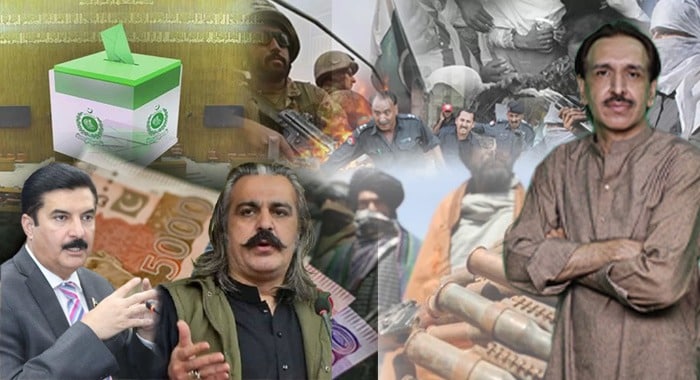The deteriorating security situation in Khyber Pakhtunkhwa (KP) is not merely a law-and-order concern anymore, it is a crisis of governance, capacity, and political will. As someone who has observed the region closely for decades, I must reiterate with urgency: the provincial government of KP has no counter terrorism policy. What exists in its place is a hollow shell of leadership, political posturing, and dangerous appeasement of violent actors.
One of the most shocking indicators of this institutional decay came when a sitting Chief Minister, Ali Amin Gandapur, casually admitted—whether off-the-record or in a moment of misplaced candour—that he, too, had paid extortion money to terrorists. Some call it “chanda,” others call it “expenses.” Whatever the label, the implication remains grave: the very people entrusted with securing the province are, in one way or another, facilitating the agents of chaos.
This admission, shamefully normalised, reflects a deeper malaise. In a single week, KP Police was attacked in Bannu, Kulachi, Tank, and another district. Yet the cabinet chose not to attend a high-level security meeting led by the Chief Secretary. And even if they had, such forums lack both the authority and capacity to act decisively. The only viable platform for urgent counter-terrorism action—the Apex Committee, comprising the Corps Commander, Governor, Chief Minister, IG, and senior officials, has inexplicably remained dormant.
Let’s be clear: the absence of Apex Committee meetings isn’t just bureaucratic negligence, it is political abandonment of a burning province.
Currently, there are 28 government officers in the custody of the Tehrik-e-Taliban Pakistan (TTP). This is not just a number; it is a national shame. These officers—some kidnapped, others trapped through conspiracies—are bargaining chips in a well-oiled machine of terror. The TTP now confidently demands millions in ransom, often using jirgas to facilitate releases. They are emboldened by the knowledge that there is no coherent state response. The provincial leadership is not only politically embroiled but also mired in allegations of facilitating terrorism.
The history of KP’s political leadership with terror financing is not recent. Parvez Khattak’s government in 2013 allowed local strongmen and elected representatives to “donate” to militant outfits under the pretense of maintaining peace. His successor, Mehmood Khan, allowed extortion to become institutionalised through backdoor negotiations with Swat Taliban, sometimes even facilitating ransom deals through his own relatives and party leaders.
Ali Amin Gandapur, the current chief executive, is at least honest about this betrayal. But confession without correction is complicity.
Meanwhile, the civilian bureaucracy—capable but powerless—watches helplessly. Officers like Shah Wali Shah, while sincere, do not have the authority to launch or sustain operations of the magnitude KP demands. Effective operations require military support, logistical coordination, and above all, political clarity. And that clarity can only come from the Apex Committee, which continues to be sidelined in favour of Senate horse-trading and intra-party bickering.
Amid all this, tribal leaders are being consulted in meetings, and while consultation is commendable, it’s also been tried for years, with little outcome. The previous and current Corps Commanders, including capable officers like Maj. Gen. Adil, have engaged local leaderships with sincerity. We have seen some progress, such as limited internet restoration and border easing in North Waziristan—but these are isolated acts of efficiency, not part of a holistic strategy.
The governor, who is in a position to act as a neutral federal representative, should at least host an all-parties conference on security. His residence, often used for ceremonial events, must become the epicentre of emergency political consensus. We are facing a clear breakdown in civil governance, and every stakeholder must be brought to the table—including opposition voices, tribal leaders, and military officials.
The costs of this failure are staggering. Fear has taken root in the province. Businesses are shifting to Punjab or abroad. Tourism, a vital revenue source, is disappearing. When provincial tourism officers themselves admit they cannot guarantee safety, they forfeit their moral right to hold office. It is tragic that Swat, once the crown jewel of Pakistan’s tourism map, is now better known for roadside killings and Taliban flags.
And yet, while all this unfolds, the provincial government is assigning more important positions to those previously suspended or incompetent. There are elected representatives who can’t even remove a rogue SHO from office, yet they claim they will free their political leader from a powerful establishment. The hypocrisy is both astounding and disheartening.
Furthermore, if the provincial government is facilitating or turning a blind eye to the very militants it once condemned as Fitna al-Khawarij or Fitna al-Hindustan, then it must accept responsibility for every soldier, officer, and civilian who falls victim to this violent resurgence.
The path forward is not easy, but it is clear:
Immediate convening of the Apex Committee, involving military, civil, and political leadership.
A unified counter-terrorism policy, framed not in press statements but in actionable plans with deadlines and accountability.
Transparent communication with the public to restore trust and reduce fear.
Reinvestment in police and intelligence capacity, especially in vulnerable districts.
A zero-tolerance approach to funding or facilitating militants, even under the guise of peacekeeping.
Finally, the federal government and military establishment must take note. As Pakistan signs trade and infrastructure deals with regional players like Afghanistan and Uzbekistan, the gateway province of Khyber Pakhtunkhwa cannot be left to burn. No railway, no economic corridor, no foreign investment will succeed if KP becomes synonymous with insecurity and instability.
This is no longer a provincial problem. This is Pakistan’s problem. And if the political class does not wake up now, history will remember them not as passive observers, but as willing collaborators in the undoing of peace.





